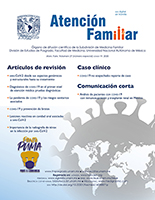Diagnóstico de COVID-19 en el primer nivel de atención médica: pruebas diagnósticas
Contenido principal del artículo
Resumen
La enfermedad causada por el nuevo coronavirus (sars-CoV-2) ha afectado a prácticamente todo el mundo desde su reporte en diciembre de 2019, en la ciudad de Wuhan, China. En la mayoría de los casos, la enfermedad tendrá una presentación de sintomatología de leve a moderada; en los casos de presentación grave, es necesaria una atención y monitorización hospitalaria cercana con tratamiento de soporte. Debido a la ausencia de tratamiento dirigido específico o vacunas con efectividad comprobada, la única herramienta disponible para reducir la transmisión del sars-CoV-2 es la identificación oportuna y aislamiento de las personas con la infección, así como de las personas asintomáticas con antecedente de contacto estrecho con un caso confirmado. Las pruebas disponibles actualmente consisten en la detección de secuencia de ácidos nucleicos mediante la prueba de reacción en cadena de la polimerasa con transcriptasa inversa (rt-pcr), serologías y detección de antígenos virales. La prueba estándar para el diagnóstico de la covid-19 es la rt-pcr. La sensibilidad y especificidad de la prueba varía de acuerdo con el momento en que se toma la muestra respecto al inicio de los síntomas. La muestra nasofaríngea tiene una mayor sensibilidad. Una correcta interpretación de las pruebas depende del contexto del paciente, de la etapa de la enfermedad en que se encuentre y de las variantes preanalíticas. La información continúa actualizándose por lo que es fundamental mantenerse a la vanguardia ante las nuevas pruebas diagnósticas y manejo de la covid-19.
